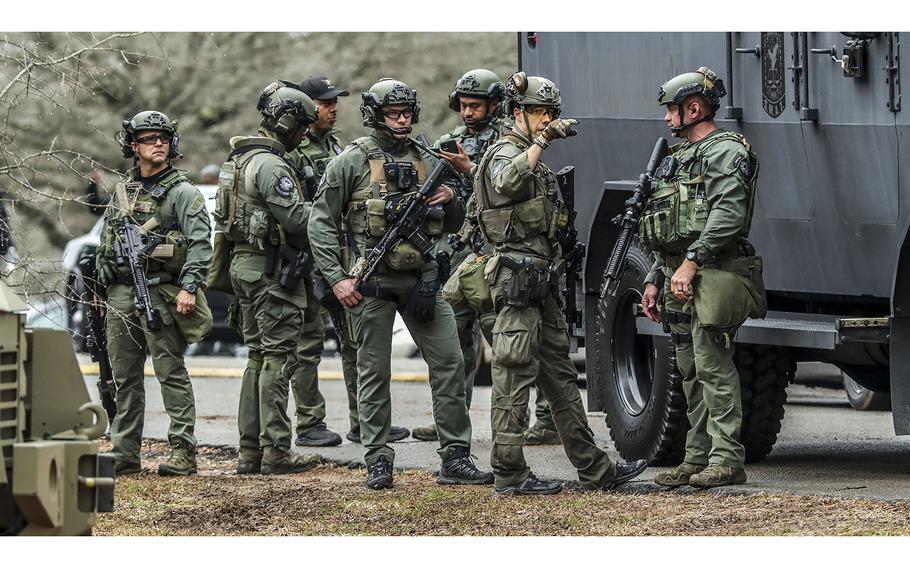
DeKalb and Atlanta SWAT members leaving from Gresham Park command post. Georgia state troopers helping conduct a “clearing operation” at the site of Atlanta’s planned public safety training center exchanged gunfire with a protester on Jan. 18, 2023, leaving the protester dead and one trooper wounded, according to the Georgia Bureau of Investigation. (John Spink/The Atlanta Journal-Constitution/TNS)
ATLANTA (Tribune News Service) — Carrying backpacks and bedrolls, a group arrived at a forest just outside Atlanta one balmy March afternoon. At the edge of a thicket of loblolly pines, they stepped over a concrete slab decorated with a mural of a police car, overturned and aflame.
They passed a folding table spread with flyers listing numbers for legal help in case of arrest, and instructions for writing to fellow activists jailed on domestic terrorism charges.
“THIS IS NOT A LOCAL STRUGGLE,” one flyer said. “Every day that passes, the police are hurting and killing people; meanwhile, the planet burns.”
The campers were joining hundreds of activists from across the nation and even a few from Europe who have flocked to this Deep South metropolis to fight plans to build an 85-acre police and firefighter training complex in an urban forest just south of the city limits. Portraying the complex as a dystopian hub for law enforcement to practice urban warfare against poor Black residents, the activists have dubbed it “Cop City.”
“We know that Cop City is nothing but a strategy for over-policing our communities,” said Kamau Franklin, founder of Community Movement Builders, an Atlanta nonprofit that has led opposition to the project it sees as a response to 2020 protests against police brutality. “They are cutting down a forest to build a militarized training center.”
The demonstration has grown into the latest epicenter of left-wing activism, drawing in climate warriors and other protesters in what they pitch as a global battle against environmental destruction, racism and police militarization.
Proponents of the complex — including most of the City Council, which is predominantly Black— envision it as a place to reimagine policing in the United States.
City officials say police have long lacked a devoted training center, that officers do pushups in the hallways of a community college. They point out that firefighters practice driving engines on city streets and do not have a “burn building” on which to practice. The complex — to include classrooms, a shooting range, a driving course and a “mock village” featuring a fake home, apartments, convenience store and nightclub — would improve officers’ morale, officials say, and train them in de-escalation, cultural sensitivity and civil rights.
“The Atlanta Police Department has been one of the leaders in reforming policing in America,” said Bryan Thomas, a spokesman for Atlanta Mayor Andre Dickens, noting the agency was among the first to adopt recommendations of President Obama’s task force on 21st century policing.
The gulf of understanding is so wide — with dueling narratives offering conflicting or hyperbolic claims — that just talking, or listening, to each other seems inconceivable.
Tension has escalated in the year and a half since a small band of activists pitched tents and built treehouses in and around the contested property in a bid to stop construction. Police say people connected to the decentralized protest movement have burned construction vehicles, vandalized contractors’ offices and hurled objects at officers. SWAT teams have raided the forest.
During a January raid, a Georgia state trooper shot and killed 26-year-old activist Manuel Esteban Paez Terán. Authorities said Paez Terán, a Venezuelan who had studied at Florida State University in Tallahassee and went by the forest name of Tortuguita, fired first and injured a trooper — a charge activists dispute.
The Georgia Bureau of Investigation is still looking into the incident, but said the bullet that struck the trooper came from a gun, found at the scene, that Paez Terán had purchased in 2020. An independent autopsy commissioned by Paez Terán’s family indicated the activist’s hands were raised — but states it was “impossible to determine” whether they were holding a firearm.
On March 5, after hundreds had gathered for a week of action, about 100 protesters left a music festival, changed into black and camouflage clothing and chanted, “Viva, viva Tortuguita” as they breached the construction site.
Police video shows activists lobbing rocks, Molotov cocktails and fireworks at retreating police. Protesters also set fire to heavy construction equipment and the base of a transmission tower that supplies power to downtown Atlanta, including Grady Memorial Hospital.
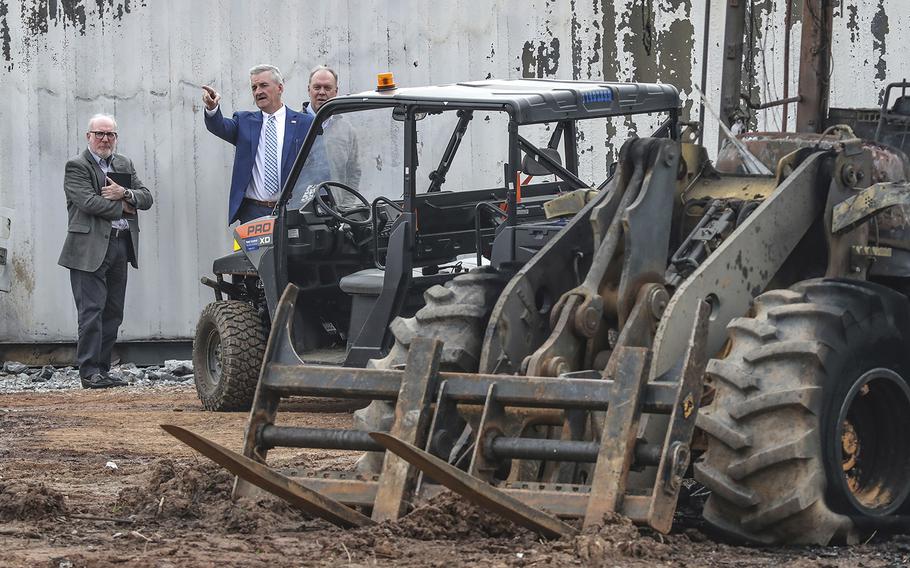
Dave Wilkinson, president and CEO of the Atlanta Police Foundation (second from left) joined Atlanta police and construction personnel to examine the site of the police training center on Monday, after violent protests on Sunday. (John Spink/The Atlanta Journal-Constitution/TNS)
Several hours later, dozens of police officers, many armed with automatic weapons, descended on the forest. A negotiator bellowed into a bullhorn, ordering people to leave the festival. Officials have charged 23 people from 15 states and two other countries — including a legal observer — with domestic terrorism, a felony that carries a sentence of up to 35 years.
Jeffrey Simms, 61, a retired fishery biologist from Tucson who flew to Atlanta to join his 21-year-old daughter and volunteered to negotiate with police on behalf of the activists, said he was not surprised by the militancy of some protesters.
“When the cops murdered Tortuguita, they unleashed something that was going to escalate,” Simms said. “I’m a peaceful protestor, so it bothers me, but it’s not even close to an eye for an eye.”
Simms’ daughter is a sociology and anthropology student from Portland who goes by the name of Bluebird — many activists would only give their forest aliases out of fear of retribution from police. She first heard about “Cop City” from a video by F.D. Signifier, a Black leftist YouTuber and content creator from Atlanta.
Bluebird said that she had not participated in destroying property or attacking officers, but that she agreed with her new friends’ message and was happy they had incited fear in the police.
“What you’re trying to do to this forest will not stand,” she said. “And we will burn your tools if you’re going to try and use those to do more destruction. This is not what people want.”
From forest to prison farm
For thousands of years, this stretch of Georgia woodlands that runs along a creek was home to Native Americans. It was known as Weelaunee, a Muscogee term for “brown water” — until the 1821 Georgia land lottery allowed white settlers to forcibly remove the Muscogee people.
The land was cleared for farms and plantations. In the 1920s, the city built a prison farm where low-level convicts were forced to grow crops and raise livestock. After half a century, the prison was abandoned and the land — apart from a police shooting range — was reclaimed by pines and privet, dewberry and muscadine vines.
Environmentalists and urban planners worked on a plan to link the site — in a working-class area southeast of Atlanta that is home to landfills and newer prisons — to neighboring forests to create a 1,200-acre network of public green space.
But in 2021, then-Atlanta Mayor Keisha Lance Bottoms suddenly laid out plans to lease 150 acres to the Atlanta Police Foundation, a nonprofit group that works with corporations to support and modernize the police force, for a $90-million police and firefighter training center.
The plan had been developed behind the scenes, with no community consultation. Activists accused the city of caving to pressure after officers had called in sick amid the 2020 protests against police brutality, crime had spiked and the wealthy neighborhood of Buckhead had threatened to secede from Atlanta.
Facing pushback, the city scaled back the plan for the training center to 85 acres and mandated that 265 acres of surrounding land be preserved as green space. After about 17 hours of public comment, a majority from people opposing the facility, the City Council approved the plan by a vote of 10 to 4.
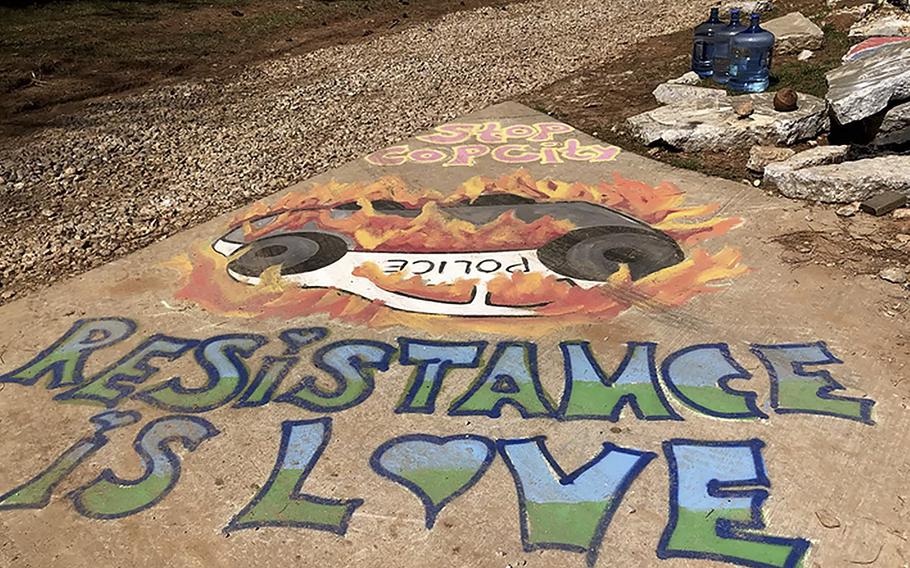
A mural depicting a burning police cruiser sits at the entrance to the forest where a police training center is scheduled to be built. (Jenny Jarvie/Los Angeles Times)
Activists started setting up camp.
Across a polluted creek bordering the contested land, poets, biologists, registered nurses, students, artists, schoolteachers and farmers flocked to the site this month, pitching tents and stringing hammocks on gently sloping land under a grove of towering conifers. Black Lives Matter and rainbow flags flew from dwellings, and cardboard signs promoted tarot readings, self-managed abortion care and group talks on transcendental anarchism.
In the base camp, which activists call the “living room,” a “Stop Cop City” banner depicting a pig in a blue uniform hung from two pine trees.
People sat on a soft floor of pine needles, chatting, sharing cigarettes, reading books. Some gathered in circles to learn how to tie figure-eight knots or to strategize about code words and hide-outs in the event of police raid.
A few steps away, volunteers worked in a makeshift kitchen stocked with propane burners, huge canisters of hot water and coffee and rows of basins for washing dishes. Vegan dinners, like jackfruit and lentil barbecue with potato salad, were hauled in on metal trays from an off-site kitchen.
The movement is proudly leaderless, pulling together a broad coalition including environmentalists, anarcho-communists, socialists and Afro-pessimists in something of an activist supervillage.
“All activities are self-organized,” a zine welcoming new activists states. “No division or in-fighting. … We honor a diversity of cultures, values, and approaches to this struggle. There are no ‘bad protesters.’”
The activists can be staunchly anti-cop. On a recent visit, a white male activist lauded the writings of Bill Ayers, a leader of the radical Weather Underground, which bombed police stations and public buildings in the 1970s.
But not everyone is on board with attacking property or cops. The day after the March 5 police raid, Bluebird said, some activists argued that those who returned to the concert after breaching the construction site and clashing with police had jeopardized the safety of people who had no idea about the confrontation. Still, most were glad that construction equipment had been destroyed and relieved that no one had been injured.
Around the campfire last week, forest defenders, as they call themselves, riffed on capitalism and human nature, the limit of logic, the importance of humility.
One activist spoke of English writer J.R.R. Tolkien’s mythology. Another cited German philosopher Immanuel Kant’s “categorical imperative” to treat humans not as a means to an end, but as an end in themselves.
As a police helicopter buzzed overhead, Simms, the retired fishery biologist, cracked open a can of Terrapin IPA.
“Do you think the cops are on a spiritual journey?” he asked.
A younger activist snorted and rolled his eyes.
“They’re human beings, too,” said Wig Wam, a 42-year-old Black urban farmer from Atlanta. “They can change.”
Simms agreed: “You can change, in a heartbeat, in the right circumstances.”
‘We’ve lost the village’
Protesting outside Atlanta Police Foundation offices one evening last week, activists screamed at the heavily armed officers guarding the property: “Pigs!” “Slavecatchers!”
Georgia officials, in turn, have dubbed protesters “violent agitators.” Atlanta’s new police chief, Darin Schierbaum, a former training commander who had forged partnerships with the National Center for Civil and Human Rights, said last week that “breaking windows and setting fires is not protest — it’s terrorism.”
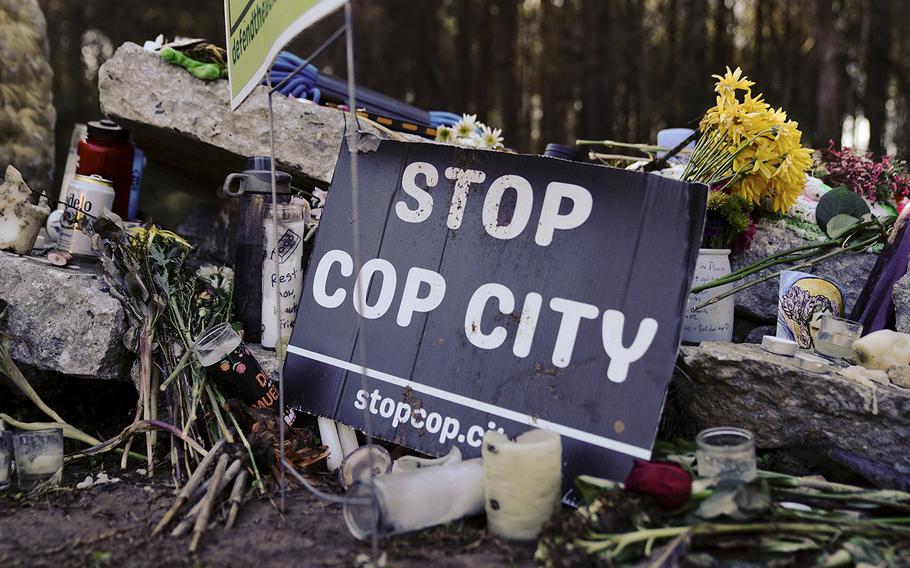
A makeshift memorial is seen on on Feb. 6, 2023, for an environmental activist who was killed while involved in a protest of the so-called “Cop City” near Atlanta, Georgia. (Cheney Orr/AFP/Getty Images/TNS)
Many legal experts dispute that claim. Damaging property and setting fires are already crimes, they note, but Georgia’s law on domestic terrorism, updated in 2017, goes beyond the federal definition to include actions that “disable or destroy critical infrastructure” with the intent to “alter, change, or coerce the policy of the government,” even when no one is harmed.
Dozens of environmental and human rights organizations signed a letter this month urging officials to drop terrorism charges against the activists: “Broad language and severe penalties,” they argued, “invite politically-motivated prosecutions aimed to monitor, punish, and chill free speech activities.”
Critics also push back against officials’ attempts to brand protesters as “outside agitators,” noting that the term was widely used by Southern segregationists to undermine the collective struggle for civil rights.
In the forest, a Black climate activist and poet who grew up in Ireland and has protested with Extinction Rebellion in Europe, said there was nothing wrong with people from outside Georgia joining the struggle.
“The whole world’s watching Atlanta repress legitimate dissent,” said the man, who goes by Shelley.
Shelley said he was disgusted to see SWAT teams combing the forest with AR-15-style rifles, and worried that far-right officials in other countries would take Georgia’s lead and criminalize ecological activism.
“It couldn’t get any worse than people being charged with domestic terrorism for just sleeping in a forest or being at a music festival at the wrong time,” he said.
As news of Stop Cop City protests spreads through left-leaning media, city officials claim they are battling misinformation. Demonstrators and movement-aligned outlets frequently downplay activist violence, officials say, and make false claims that the training center will have a Black Hawk helicopter landing pad and that 43% of trainees will be from outside police departments. According to the city, there is no plan for Black Hawk helicopters, and the 43% figure refers to Atlanta officers who are recruited from other states.
Some Black Atlantans are skeptical of the narrative that the protesters are innocent victims targeted by a jacked-up, over-militarized police.
Antonio Lewis, a 35-year-old newly elected City Council member who serves a poor, predominantly Black district in the city’s southeast, said it was wild to watch the video of police retreating from a mob of black-clad protesters. Most Black protesters, he said, would not have dared to so brazenly attack the police.
“You got Molotov cocktails, gasoline, you throw it at police, you try to burn down a transformer that goes to the main hospital for Black folk?” he said. “I don’t think no Black person would have survived to tell their story!”
Lewis said he would not have voted for the training center in 2021. The previous year, he helped organize protests after his friend Rayshard Brooks was shot by in the back by a police officer after he resisted arrest and grabbed a Taser.
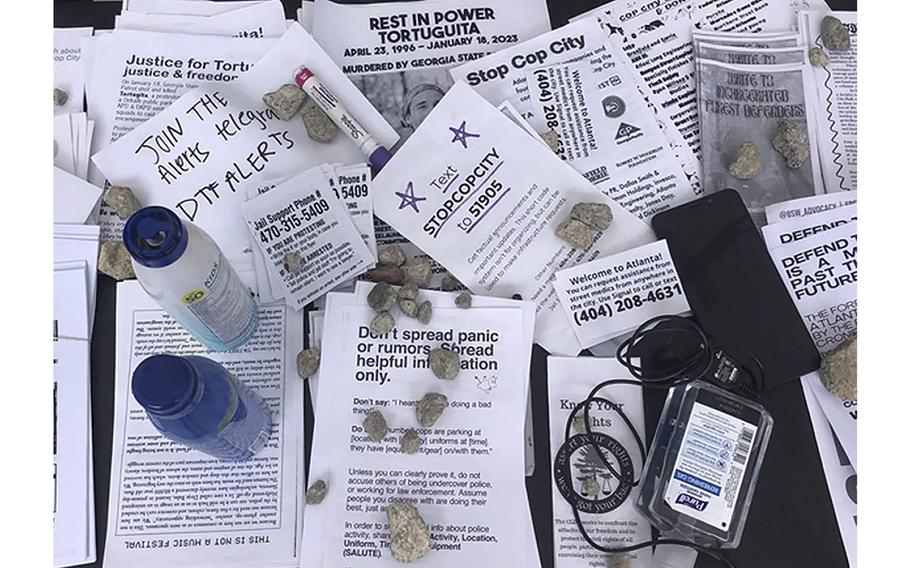
A folding table at the entrance to the forest is spread with fliers listing numbers activists can call for legal help if they are arrested. They also offer instructions for writing to fellow activists jailed on domestic terrorism charges. (Jenny Jarvie/Los Angeles Times)
But Lewis emphasized that he was not anti-police.
“When my mother was murdered, shot over 20 times, you know who my grandmother called?” he asked. “The police.”
Now that he was in office, he said, he was “working like hell” on reforming the department.
“We ain’t militarizing no police, we ain’t sending no tanks in here,” Lewis said. “We have one of the Blackest police forces in the world. Now let’s reimagine public safety for real!”
Many of the activists are reluctant to heed his call.
Catching up with her father on a trail after taking part in a forest cleanup, Bluebird said she felt uplifted after connecting with fellow activists committed to fighting what she called the destructive nature of capitalism.
“I freakin’ love this community, like, so much,” she said. “I have felt so alienated for most my life without realizing it, just because of the way our society is structured, around just the family unit.”
Simms nodded.
“We’ve lost the village, the feeling of the village, connectedness,” he said softly. “I feel that, too.”
Together, they walked up the trail, greeting the new activists walking into the forest.
©2023 Los Angeles Times.
Visit latimes.com.
Distributed by Tribune Content Agency, LLC.